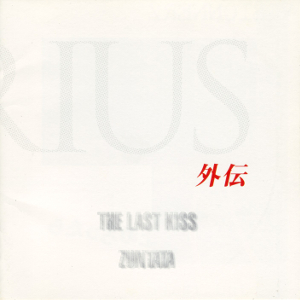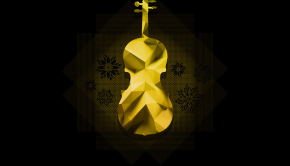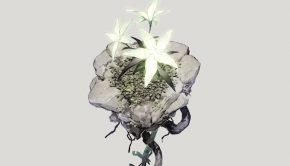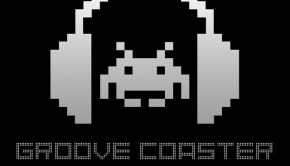Darius Gaiden -The Last Kiss-
 |
Album Title: Darius Gaiden -The Last Kiss- |
| Record Label: Zuntata Records |
|
| Catalog No.: ZTTL-0013 |
|
| Release Date: July 21, 1997 |
|
| Purchase: Download on iTunes |
Overview
The album Darius Gaiden -The Last Kiss- features arrangements of the third game in the Darius series Darius Gaiden. While the album was released shortly after Darius the Omnibus, it was made in different circumstances. Instead of asking members of Zuntata to arrange the music, Taito instead outsourced the arrangements to studio musicians Hideyuki Suzuki and Koji Igarashi. How well do they interpret the originals and do they do OGR’s originals justice?
Body
“VISIONNERZ” opens with playful synth combined with manipulation of vocal samples featured within the original. As it progresses, it adds a bit of a funk rock atmosphere. During these sections, I think the sensual nature of the original is lost a bit, but it’s still quite entertaining. There are also some industrial influenced sections that, although short, that helps retain the feel of the original. “E.E.G.” features the same components as the original, but at the same time, I think a lot of the intensity is lost. The overall flow is much mellower and I think that this slowed tempo really does a disservice to the original. I do like the synthesized elements of the arrangement though.
The arrangement of “Burst Out” is definitely more rock oriented in approach, unlike the original which fused together industrial and Asian soundscapes. There is some funky bass guitar accompaniment and a keyboard/electronic harmony as well, but for the most part, the track consists of heavy guitar riffs and both militaristic and rock-style percussion. It’s definitely an interesting take on the original. “INDUCTION” is also complete transformation from the haunting and mysterious original. It’s a keyboard heavy arrangement with a bit of a jazz feel and features some funky bass grooves and some quirky synthesizer accompaniment. It’s definitely a unique take on the original, but I feel that some of the beauty of the original was definitely lost in this transformation.
“AXON” is another arrangement where I feel the arrangers did a disservice to the original. What made the original so awesome is the intense percussion and overall tempo. The arrangement, on the other hand, incorporates some more ethnic percussion, some spoken vocal samples in the beginning, and some chime-like industrial synth at a drastically reduced tempo. It’s a shame that the best part of the arrangement, when the tempo increases and adds some rock riffs, is so short-lived. It would have made the arrangement better if the entire arrangement was done in that style.
Fortunately, not all the arrangements are regressions. Most notably, “Reflection” is a very beautiful take on the original. It’s a beautiful arrangement with some ethnic percussion, a beautiful woodwind melody, and some ethereal synthesizer and strings harmony. It has a very Asian soundscape at times and just manages to soothe the soul. Another top notch arrangement belongs to “Tranquilizers.” The original, which was very haunting and mysterious, is transformed into a very haunting and mysterious arrangement with some synthesizer harmonies .The militaristic percussion, the evocative piano passages, and crystalline synth passages really capture a very tranquil atmosphere, but at the same time, manage to create a very mysterious and airy tone as well. Surprisingly, some more organic instrumentation is added, such as an accordion, and overall, it really fits well into the arrangement.
“FAKE” is an intriguing arrangement. It’s not my favorite, but it’s definitely not one of the worst arrangements on the album. It features some ethnic percussion, haunting choral samples, mysterious synthesizer sections, some intense industrial beats, and the occasional electric guitar passage. Overall, it’s a decent theme that I don’t mind listening to from time to time. The original “Singing in the BRAIN” had a very distinctive Asian sound. The arrangement, on the other hand, is a playful orchestral number that manages to include some of those Asian flavors as well. I really like the piano, the exotic percussion samples, and the strings harmony. It’s a very beautiful theme and I wish it was longer. Finally, “SELF” features an R&B-like rhythm. In addition, there are some beautiful synthesized melody and harmony lines. The bass guitar work is also quite groovy. Overall, this one has a very evocative atmosphere, but at the same time, I don’t particularly find the arrangement to be that strong.
Summary
The music for Darius Gaiden was even more experimental in nature than Darius and Darius II. To make an arrangement album of the original is definitely a daunting task, and for the most part, I think that Hideyuki Suzuki and Koji Igarashi succeed in adapting the original album and providing some interesting interpretations. But many of the arrangements, in my opinion, are weaker than the original counterparts because of the loss of intensity or the slowing of tempo. It’s a decent album with a few standout arrangements, but for the more casual Darius fan, this may be worth passing up. While the physical version is now out-of-print, a digital edition can be purchased through iTunes.
Do you agree with the review and score? Let us know in the comments below!
3
Posted on November 10, 2015 by Don Kotowski. Last modified on November 7, 2015.














